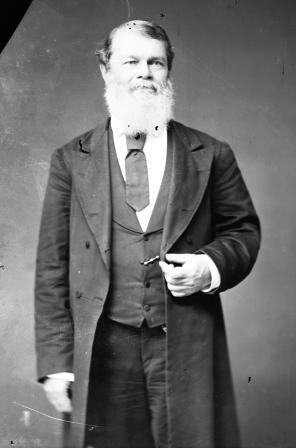(September 7, 2012) - On this date in 1862, Beriah Magoffin was settling back into private life in Harrodsburg, his hometown, having finally given up the governorship.
Back in Frankfort, the Unionists were rallying to James F. Robinson of Georgetown, the new governor.
Moderately pro-Southern, Magoffin had resigned on Aug. 18, 1862. He had been at odds with the Unionist legislature since the start of the secession crisis that preceded the war.
Not until Aug. 16, 1862, did Magoffin hint he might step down, and only then “provided a successor is chosen to suit him, but not otherwise,” Lewis and Richard Collins wrote in their History of Kentucky.
Magoffin, a Democrat, was elected in 1859. He was fiercely pro-slavery and believed states had the ultimate right to secede. But he was unwilling to lead Kentucky out of the Union like Kentucky-born Missouri Gov. Claiborne F. Jackson tried unsuccessfully to do in the Show Me State.
In the presidential election of 1860, Magoffin supported Vice President John C. Breckinridge of Lexington, the pro-slavery Southern Democratic candidate. Abraham Lincoln, the anti-slavery Republican, was elected.
Many Southern political leaders had warned that their states would secede if Lincoln and his party were voted in. They said the "Black Republicans" would end slavery.
Magoffin cautioned against immediate secession. Instead, he called on all 15 slave states to meet together and demand federal protection for slavery and its expansion into the federal territories.
If the Republicans refused the slave state demands, Magoffin said, secession would be justified, and the South could leave the Union as a unit.
Nothing came of Magoffin's proposal. In December, South Carolina seceded and urged the other slave states "to join us, in forming a Confederacy of Slaveholding States." Ultimately, 10 more slave states would exit the Union.
While Magoffin detested Lincoln and the Republicans for their anti-slavery views, he still believed the Union might be preserved. He endorsed Kentucky Sen. John J. Crittenden's famous eleventh-hour compromise.
When it was obvious the Crittenden Compromise would fail, Magoffin decided to put the issue of Kentucky's future to the people. He called a special session of the General Assembly to convene in January, 1861.
He hoped lawmakers would provide for a sovereignty convention to decide whether Kentucky should remain in the Union or secede.
The Unionists, who quickly cobbled together majorities in the House and Senate, worried that a convention might put Kentucky in the Confederacy. So they refused to call one and steered the legislature away from secession.
After the war began in April, Magoffin sternly refused Lincoln’s call for Bluegrass State soldiers. He warned the president, “Kentucky will furnish no troops for the wicked purpose of subduing her sister Southern states.”
Yet he did not agree to Confederate requests for Kentucky soldiers either.
The great majority of Kentuckians opposed secession. But they didn't want to shed the blood of their fellow Americans North or South. Hence, in May, Kentucky declared itself neutral, but within the Union.
In August, the Union party won big in elections for the state legislature. Afterwards, Camp Dick Robinson, a recruiting post for Union volunteers, opened in strongly Unionist Garrard County.
Kentucky clearly was moving toward outright support for the Union and for war against the Confederacy. Even so, Magoffin strongly protested the camp to Lincoln, claiming it violated Kentucky neutrality. In his reply, Lincoln told the governor that he doubted "you entertain any desire for the preservation of the Federal Union."
In the end, the Yankee and Rebel brass saw Kentucky as too strategic to leave alone. In early September, Confederate, then Union, armies invaded the state – at Hickman, Columbus, Paducah and Smithland. The legislature ordered only the Rebels to leave and fully embraced the Union war effort.
Yet Magoffin defied the legislature and vetoed the bills ending neutrality, providing for the arming and equipping of troops for the Yankee army and cracking down on Confederate sympathizers. Angry Unionists denounced him as a traitor.
In November, many of Magoffin's secessionist friends gathered behind Rebel lines at Russellville and created a rump Confederate state government. He refused their invitation to be the state's Rebel "governor." Magoffin condemned the Russellville Convention "in unqualified terms," declaring the government it created was "self-constituted" and formed "without authority from the people."
All the while, Magoffin opposed the war and legislation to prosecute it. Many Unionists concluded the governor should be arrested or impeached, or both.
Magoffin steadfastly refused to yield or to quit.
The absence of a lieutenant governor complicated the issue. Democrat Linn Boyd of Paducah, elected with Magoffin, died before he took office.
Had Boyd lived, the Unionists likely would have found him more objectionable than Magoffin. Boyd’s widow was an outspoken secessionist. His son and brother joined the Confederate army.
In part, Magoffin hesitated to resign because he knew his constitutional successor would be the speaker of the senate, staunch Unionist John F. Fisk of Covington. Magoffin didn't like him.
But in the end, the governor and legislative leaders cut a deal: Fisk would give up the speakership in favor of Robinson, whom Magoffin found acceptable.
In turn, Magoffin would resign, making Robinson governor. Fisk would then stand for reelection as speaker.
The agreement went off as planned. Robinson was sworn in as governor; Fisk was voted back in as speaker, and Magoffin went home.
-- Berry Craig is a professor of history at West Kentucky Community and Technical College in Paducah and is the author of True Tales of Old-Time Kentucky Politics: Bombast, Bourbon and Burgoo, Hidden History of Kentucky in the Civil War, Hidden History of Kentucky Soldiers and Hidden History of Western Kentucky. The books are being sold to raise money for scholarships at WKCTC. They are available by contacting Craig by phone at (270) 534-3270 or by email at berry.craig@kctcs.edu.
|







